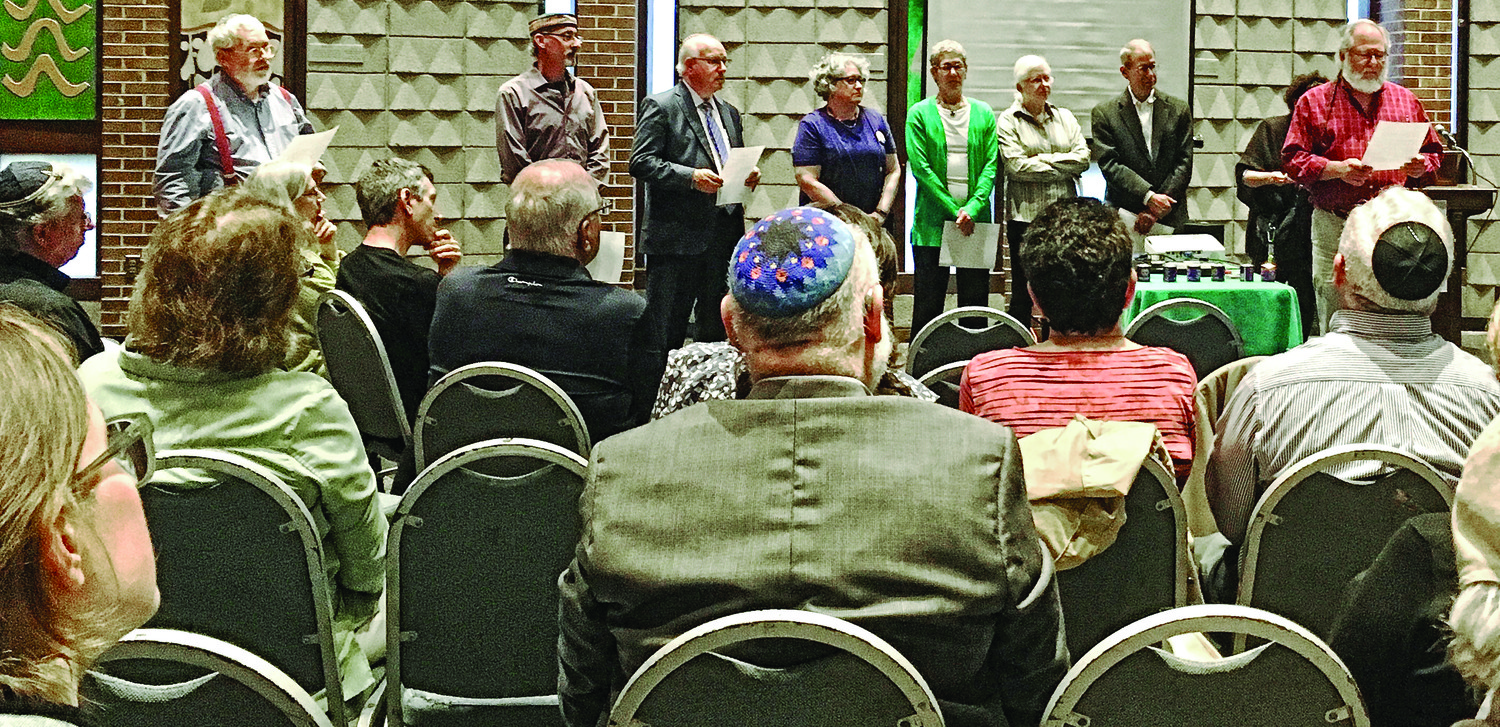Rabbi Rachel Grant Meyer talks at Emanu-El about the Jewish obligation to help refugees
On June 6, members of Providence’s Jewish community met at Temple Emanu-El to honor the memories of Jews who died in 1939 when the S.S. St. Louis was forced to return to Europe after being denied entry to Cuba, the United States and Canada.
The group of almost 60 met to learn how and why we as Jews must work to prevent such tragedies from occurring again. Rabbi Rachel Grant Meyer, the director of Education for Community Engagement at HIAS (the Hebrew Immigrant Aid Society), presented a heart-stirring and informative talk about the current refugee crisis and an overview of the work HIAS is doing to address it.
Many readers may recognize HIAS as the agency that helped resettle families in the United States starting in the 1880s. During its first 120 years, HIAS resettled 4.5 million Jews in the U.S. HIAS is the world’s oldest refugee resettlement agency, and their work continues to this day, helping people of all races, religions and ethnicities who are fleeing persecution and violence. Their task today is daunting. The United Nations Refugee Agency estimates the total number of displaced persons and refugees at more than 65 million, 51 percent of whom are children. The largest single ethnicity represented among this group is Syrian, but the group also encompasses Rohingya Muslims, people escaping violence in Sudan and Eritrea, and people fleeing Central America where gang and sexual violence are rampant.
Meyer described four ways in which HIAS is responding to the crisis. First, they are providing on-site services internationally, support that includes legal services, psychosocial support and job training. The term refugee was not officially defined until the Refugee Convention of 1951, in response to attempts to force displaced Jews from World War II to return to the lands of their persecution. A refugee was termed, “anyone persecuted for their race, religion, nationality, political opinion or membership in a particular social group.” Participants in the conference committed to never send refugees back to the country of their persecution, but instead to find “durable solutions” for such people.
One of these solutions continues to apply to the second part of HIAS’s work: domestic resettlement in the United States. This includes helping people to find housing, enroll in schools and other educational programs and access health care. Sadly, Meyer told the group, this process of resettling refugees has become more difficult over the last 18 months as fewer and fewer refugees have been allowed into the United States. Beginning with President Donald Trump’s executive order in January 2017, numerous policies have been enacted designed to prevent refugees from entering the U.S. She said the consequences have been catastrophic. For instance, during the last year of the Obama administration, 86,000 refugees were resettled. As of May 17 of this year, only 13,785 refugees have been resettled, of whom only 11 are Syrian.
The third part of HIAS’s work involves advocating for refugee rights directly on Capitol Hill in Washington, D.C., and mobilizing American Jews to fight for refugee-friendly policies and laws. In a departure from previous efforts, HIAS has taken legal action, adding its name to three appeals questioning the constitutionality of the current administration’s policies.
The fourth part of HIAS’s work involves promoting advocacy and action from the Jewish community. Tens of thousands of Jews throughout the country are responding to this call for action, Meyer said. Their response includes giving tzedakah, volunteer work, attending rallies and political advocacy. More than 400 synagogues have signed onto the HIAS Welcome Campaign, committing themselves to take action in this struggle. Although Rhode Island’s elected officials are strong advocates of welcoming refugees, Meyer pointed out we should continue to call them and thank them for their support.
In closing, the rabbi said, “More than anything else that the Torah teaches, this holy text tells us that we have an obligation to welcome, love and protect the stranger… that for us, ‘never again’ means never again for EVERYONE.”
So start right now! Go to HIAS.org and take action. Don’t find yourself regretting in years to come that you did not do everything you could to save the thousands of people needing your help.”
MAIA BRUMBERG-KRAUS is the chairperson of the Social Justice Committee at Temple Emanu-El in Providence.








